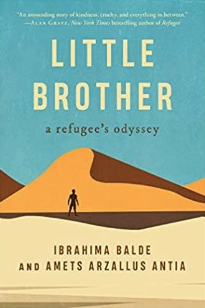Little Brother: a refugee’s odyssey is a heart-wrenching tale about migration, family, and hope. Set across many countries in Africa and stretching to Europe, this autobiographical novel is a punchy account of the main character (the author) Ibrahima’s journey – mostly on foot – to Mali, the Sahara Desert, Algeria, Libya, and Morocco in search of his little brother in the refugee camps.
The story starts in Guinea, where Ibrahima was raised by his father, away from his mother and other siblings. After this latter’s death, and still a child, Ibrahima goes to live with the other part of his family. But his stay with them is short as he leaves in search of work to help them. A goal he sees within his reach when a truck driver takes him as an apprentice. After some time of learning, though, his mother informs him over the phone that his little and only brother Alhassane left school and the country hoping to migrate to Europe. And so Ibrahima takes off again, this time searching for his little brother to convince him to return home and complete his education. Along his journey, the young man meets all kinds of horrific hardships, from having to walk the desert to not eating or drinking water for days and from sleeping outside on concrete ground to being tortured and imprisoned by human traffickers. But fueled by his quest to find Alhassane, whom he finally learns to have capsized with many others in the sea while trying to cross to Europe, he survives.
As he tells his own story, Ibrahima also recounts how many just like him have faced and are facing the same hardships on the road and in the refugee camps. We learn from his tale how many migrants and refugees are working for almost nothing in the cities they go to, how they are held brutally captive to be sold as slaves and how they are sent in big numbers to their deaths on fragile zodiac boats. But while Little Brother: a refugee’s odyssey is a brutal story about the horrific realities of migration, it is also a story about what makes most migrants choose to face them, which is to help their families back home.
Ibrahima was forced to stay only with his father as a child. He was indeed raised away from his mother, his little brother, and his two little sisters. However, he always kept them in mind and longed for them, and when he reunites with them after his father’s death, they occupy his whole mind and heart. This concern and love for his family push him to go away at first to look for work. Then a second time to look for Alhassane, who also left out of concern for his brother and his desire to help him take care of their family. And like the narrator and his little brother, the desire to help one’s family is why many choose migration with all its perils and uncertainties. However, while this choice takes them away from their families and homes, it’s one fired by hope.
Throughout the story of Ibrahima, hope is what makes him and other migrants relentless in the pursuit of their quests. The narrator feels guilty towards his brother, and that’s why he takes off after him. However, it’s his persistent faith that he will find him that maintains him on his feet and on the road despite all the perilous difficulties he encounters. A belief that has also been held by the few good encounters he makes in his bleakest moments. Ismail, a boy who massages his swollen feet and shows him where to find work, and Amets Arzallus Antia, the poet who helps him tell this heart-wrenching story. It’s also the same hope that makes the other migrants and refugees go all the way in spite of its dangers – first to successfully cross the sea to Europe, then to find work to help their families back home.
Little Brother: a refugee’s odyssey is a genuinely heartbreaking book. It has been translated into Spanish and then English. Still, the voice of the narrator and storyteller dominates the text and the narrative with its innocence, desperation, grief, and hope. And with it being dominantly a story about migration, its harsh realities, and perils, it’s also an intimate story about one particular family broken by its precarious situation but whose bond built on love remains powerful, fueled by continuous hope.
The story starts in Guinea, where Ibrahima was raised by his father, away from his mother and other siblings. After this latter’s death, and still a child, Ibrahima goes to live with the other part of his family. But his stay with them is short as he leaves in search of work to help them. A goal he sees within his reach when a truck driver takes him as an apprentice. After some time of learning, though, his mother informs him over the phone that his little and only brother Alhassane left school and the country hoping to migrate to Europe. And so Ibrahima takes off again, this time searching for his little brother to convince him to return home and complete his education. Along his journey, the young man meets all kinds of horrific hardships, from having to walk the desert to not eating or drinking water for days and from sleeping outside on concrete ground to being tortured and imprisoned by human traffickers. But fueled by his quest to find Alhassane, whom he finally learns to have capsized with many others in the sea while trying to cross to Europe, he survives.
As he tells his own story, Ibrahima also recounts how many just like him have faced and are facing the same hardships on the road and in the refugee camps. We learn from his tale how many migrants and refugees are working for almost nothing in the cities they go to, how they are held brutally captive to be sold as slaves and how they are sent in big numbers to their deaths on fragile zodiac boats. But while Little Brother: a refugee’s odyssey is a brutal story about the horrific realities of migration, it is also a story about what makes most migrants choose to face them, which is to help their families back home.
Ibrahima was forced to stay only with his father as a child. He was indeed raised away from his mother, his little brother, and his two little sisters. However, he always kept them in mind and longed for them, and when he reunites with them after his father’s death, they occupy his whole mind and heart. This concern and love for his family push him to go away at first to look for work. Then a second time to look for Alhassane, who also left out of concern for his brother and his desire to help him take care of their family. And like the narrator and his little brother, the desire to help one’s family is why many choose migration with all its perils and uncertainties. However, while this choice takes them away from their families and homes, it’s one fired by hope.
Throughout the story of Ibrahima, hope is what makes him and other migrants relentless in the pursuit of their quests. The narrator feels guilty towards his brother, and that’s why he takes off after him. However, it’s his persistent faith that he will find him that maintains him on his feet and on the road despite all the perilous difficulties he encounters. A belief that has also been held by the few good encounters he makes in his bleakest moments. Ismail, a boy who massages his swollen feet and shows him where to find work, and Amets Arzallus Antia, the poet who helps him tell this heart-wrenching story. It’s also the same hope that makes the other migrants and refugees go all the way in spite of its dangers – first to successfully cross the sea to Europe, then to find work to help their families back home.
Little Brother: a refugee’s odyssey is a genuinely heartbreaking book. It has been translated into Spanish and then English. Still, the voice of the narrator and storyteller dominates the text and the narrative with its innocence, desperation, grief, and hope. And with it being dominantly a story about migration, its harsh realities, and perils, it’s also an intimate story about one particular family broken by its precarious situation but whose bond built on love remains powerful, fueled by continuous hope.
Saliha Haddad is a junior literary agent at Worlds Arts Agency. She graduated in the field of Anglophone Literature and Civilization in 2015. She is a literary interviewer for the online magazine Africa in Dialogue. Her debut creative nonfiction piece has appeared in the African magazine Agbowo. Haddad is the Fiction Co-editor of the South African based literary journal, Hotazel Review.



